An Intricate Relationship: Anxiety and Addiction
Anxiety disorders and substance use disorders (SUDs) share a complex and often interwoven relationship that has captivated the attention of clinicians and researchers alike. Defined by persistent worry and fear, anxiety disorders can significantly hinder daily life, sometimes leading individuals to seek solace in substance use—a coping mechanism that often exacerbates the problem it seeks to remedy. This intricate interplay is not only prevalent but also has far-reaching implications for diagnosis and treatment, as well as for the overall well-being of affected individuals.
Understanding Anxiety Disorders and Their Symptoms
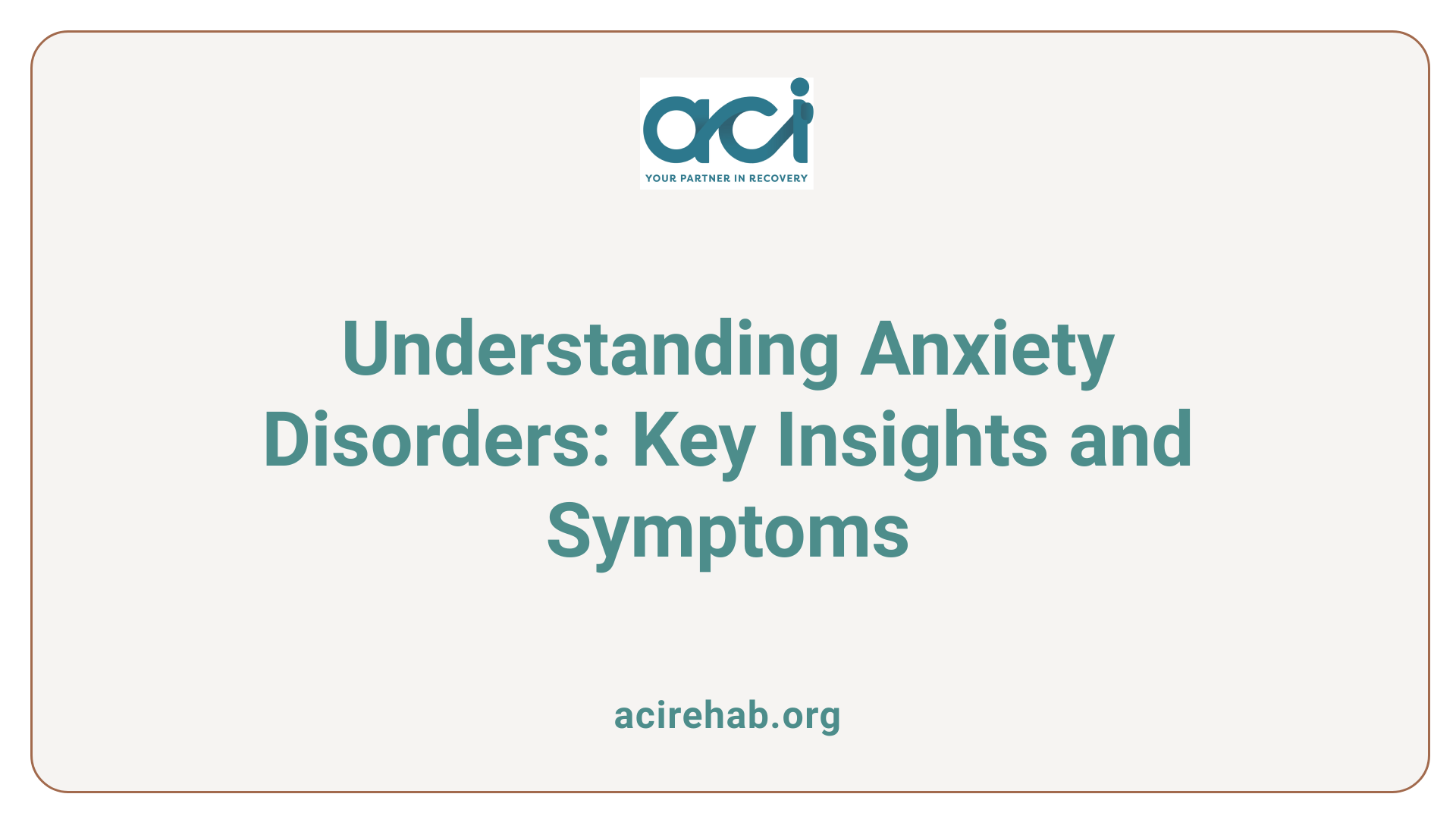
Characteristics of Anxiety Disorders
Anxiety disorders are marked by excessive and persistent feelings of worry, fear, and anxiety that can disrupt daily life. These disorders not only affect an individual’s mental state but also influence their behavior and relationships, contributing to potential substance misuse as a coping mechanism.
Types of Common Anxiety Disorders
There are several types of anxiety disorders, each presenting unique symptoms and challenges:
- Generalized Anxiety Disorder (GAD): Chronic worry about everyday issues.
- Panic Disorder: Recurrent panic attacks characterized by sudden feelings of terror.
- Social Anxiety Disorder: Intense fear of social situations and interactions.
- Phobia-Related Disorders: Extreme fear of specific objects or situations.
Symptoms and Life Impact
Anxiety disorders manifest through both physical and psychological symptoms, which can include restlessness, racing heart, insomnia, panic attacks, and excessive worry. The daily impact is substantial; individuals may experience difficulties at work, in social interactions, and with personal responsibilities. Ultimately, untreated anxiety can deteriorate overall mental health and increase the risk of developing substance use disorders, creating a vicious cycle of dependence and anxiety.
The Link Between Anxiety and Substance Use Disorders
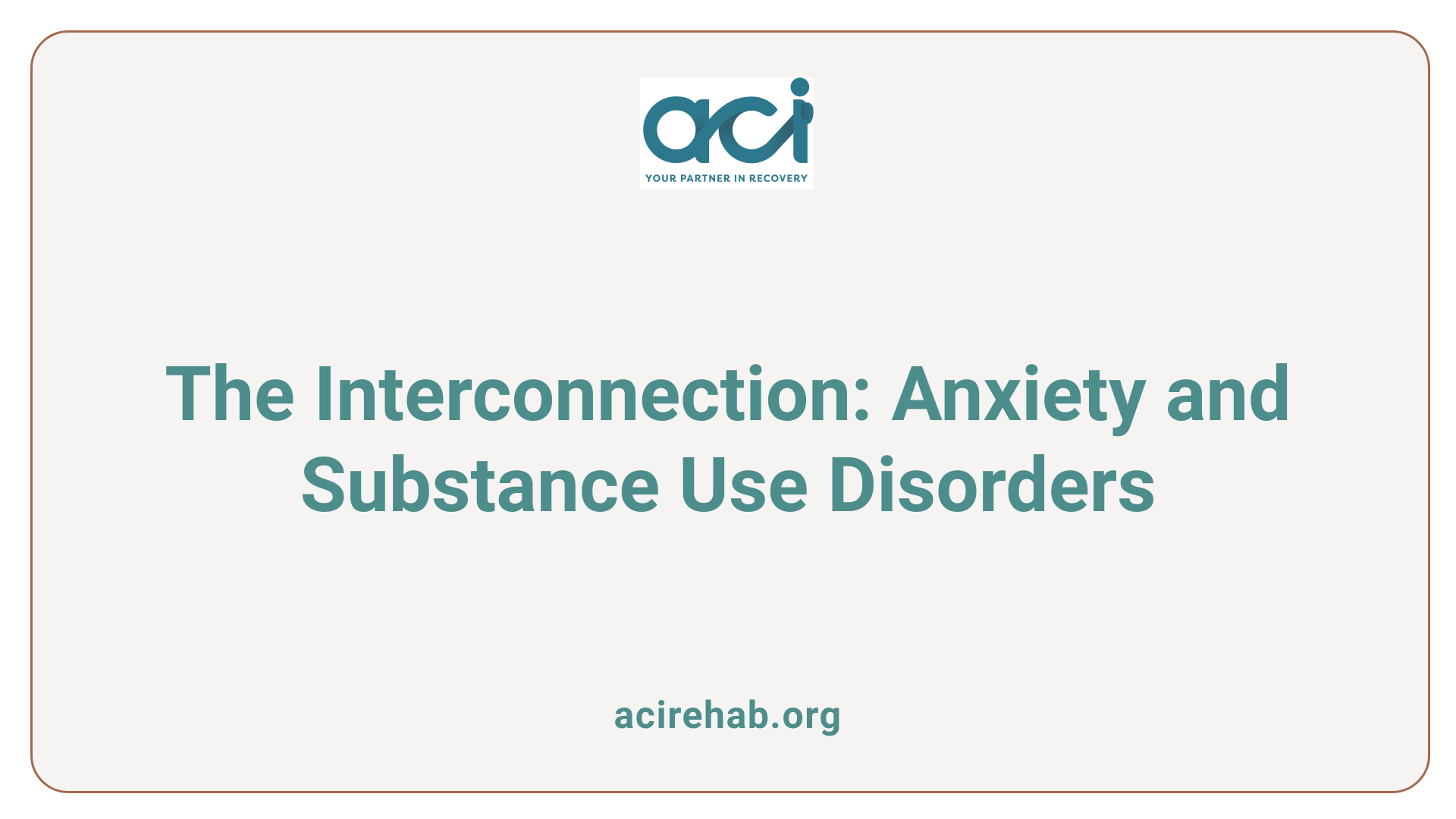
What is the connection between anxiety and alcoholism?
The connection between anxiety and alcoholism highlights a troubling reality where individuals experiencing anxiety disorders are significantly more likely to develop alcohol use disorders (AUDs). Research indicates that those with anxiety disorders are two to three times more prone to AUDs.
Different types of anxiety disorders have varying associations with alcohol use. Generalized Anxiety Disorder (GAD) and panic disorder, for instance, demonstrate stronger links to AUDs than conditions like obsessive-compulsive disorder (OCD). Economic and social stressors, particularly during challenging times such as the COVID-19 pandemic, have been shown to exacerbate alcohol consumption, especially in those already grappling with anxiety.
Moreover, gender plays a role in these dynamics. Men have a higher likelihood of developing AUDs, while women frequently resort to alcohol as a self-medication strategy to alleviate anxiety symptoms. Recognizing this connection is crucial, as effective treatment for dual cases requires a tailored approach that simultaneously addresses both anxiety and alcohol use disorders.
Statistics on co-occurrence
Statistics reveal a high prevalence of co-occurring anxiety and substance use disorders. Approximately 20% of individuals diagnosed with an anxiety disorder also struggle with substance use disorder, emphasizing the need for integrated treatment plans.
Self-medication cycle
The cycle of self-medication is particularly concerning among those with anxiety disorders. Individuals often turn to alcohol or drugs believing they will alleviate their symptoms; however, this can lead to a dangerous cycle of increased tolerance and dependency. As the effects of the substances wear off, anxiety symptoms can intensify, prompting further consumption and exacerbating the disorder. It’s essential to address this self-medication cycle to facilitate effective recovery.
Prevalence and Clinical Impact of Co-occurring Disorders
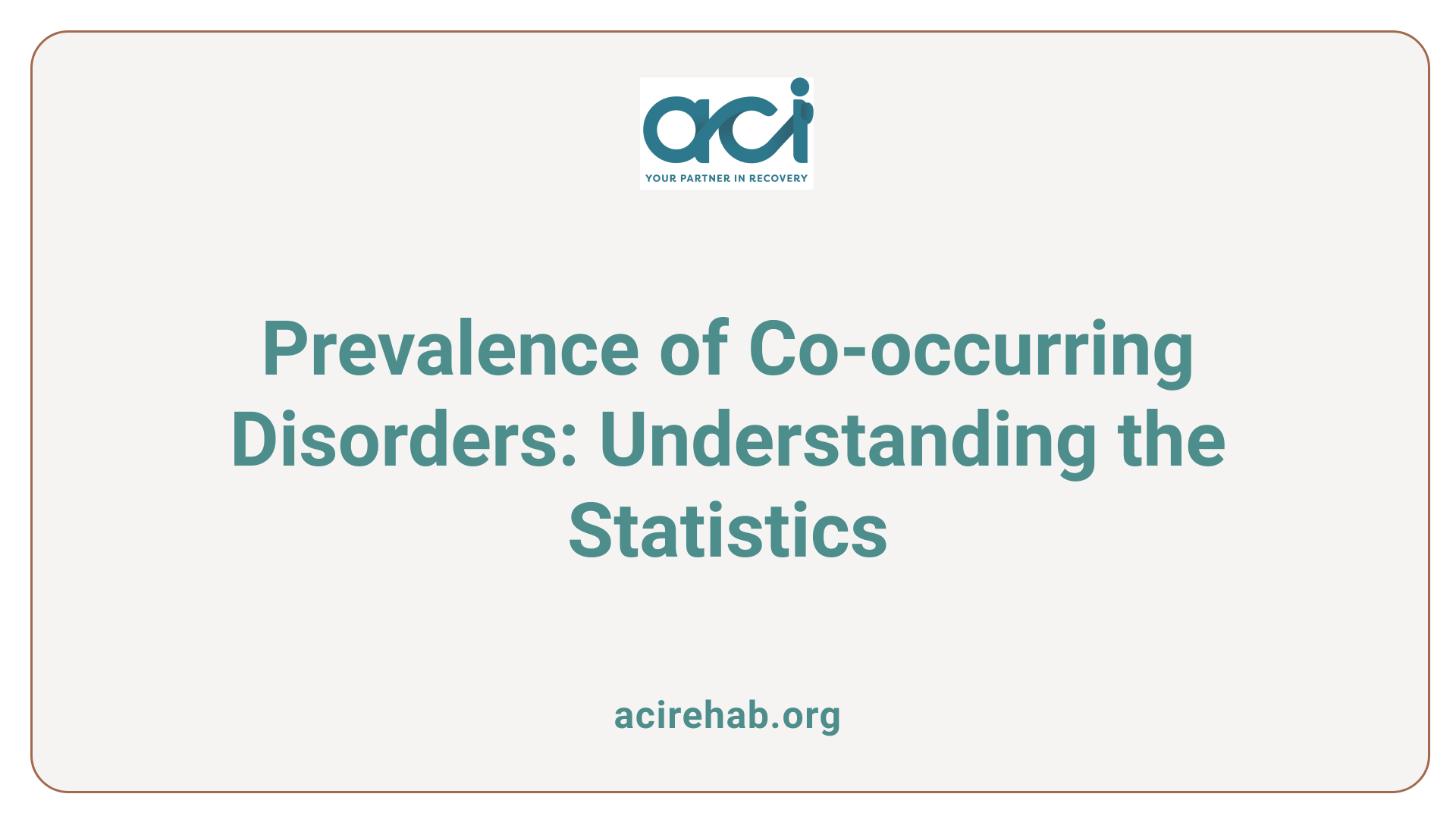
Do substance abuse and anxiety often coexist?
Anxiety disorders and substance use disorders (SUDs) frequently co-occur, with recent data indicating a significant overlap. The National Epidemiological Survey on Alcohol and Related Conditions (NESARC) reveals that roughly 17.7% of individuals with a current SUD also meet the criteria for an anxiety disorder. This relationship is not merely coincidental; rather, it reflects a complex interplay where each condition can exacerbate the other.
Particularly, anxiety disorders such as Generalized Anxiety Disorder (GAD) and Post-Traumatic Stress Disorder (PTSD) showcase elevated rates of comorbidity with SUDs. Patients often struggle with anxiety symptoms during both the intoxication and withdrawal periods of substance use.
Clinical implications
The clinical implications of co-occurring anxiety and substance use disorders are profound. Patients usually experience increased symptom severity and functional impairment, complicating treatment approaches. Approximately 20% of individuals diagnosed with anxiety disorders also grapple with a substance use disorder, highlighting the importance of recognizing these intertwined conditions.
Recognizing and addressing underlying anxiety is crucial for effective recovery from addiction. Patients with both conditions often find that their anxiety must be managed during detox and treatment to improve long-term recovery outcomes.
Challenges in treatment
Treating co-occurring disorders presents unique challenges, primarily due to diagnostic complexities. Distinguishing between substance-induced anxiety symptoms and primary anxiety disorders can be difficult, requiring careful evaluation and often extended periods of abstinence for proper diagnosis.
Effective interventions typically involve Cognitive Behavioral Therapy (CBT) and tailored pharmacotherapy approaches to address both anxiety and substance use. Careful monitoring of medication for anxiety is essential, especially because highly addictive medications such as benzodiazepines can pose risks for patients with a history of substance abuse.
In conclusion, the acknowledgment of dual diagnosis and the intricate relationship between anxiety and addiction is pivotal for formulating successful treatment plans that ensure comprehensive care.
Risk Factors and the Self-Medication Hypothesis
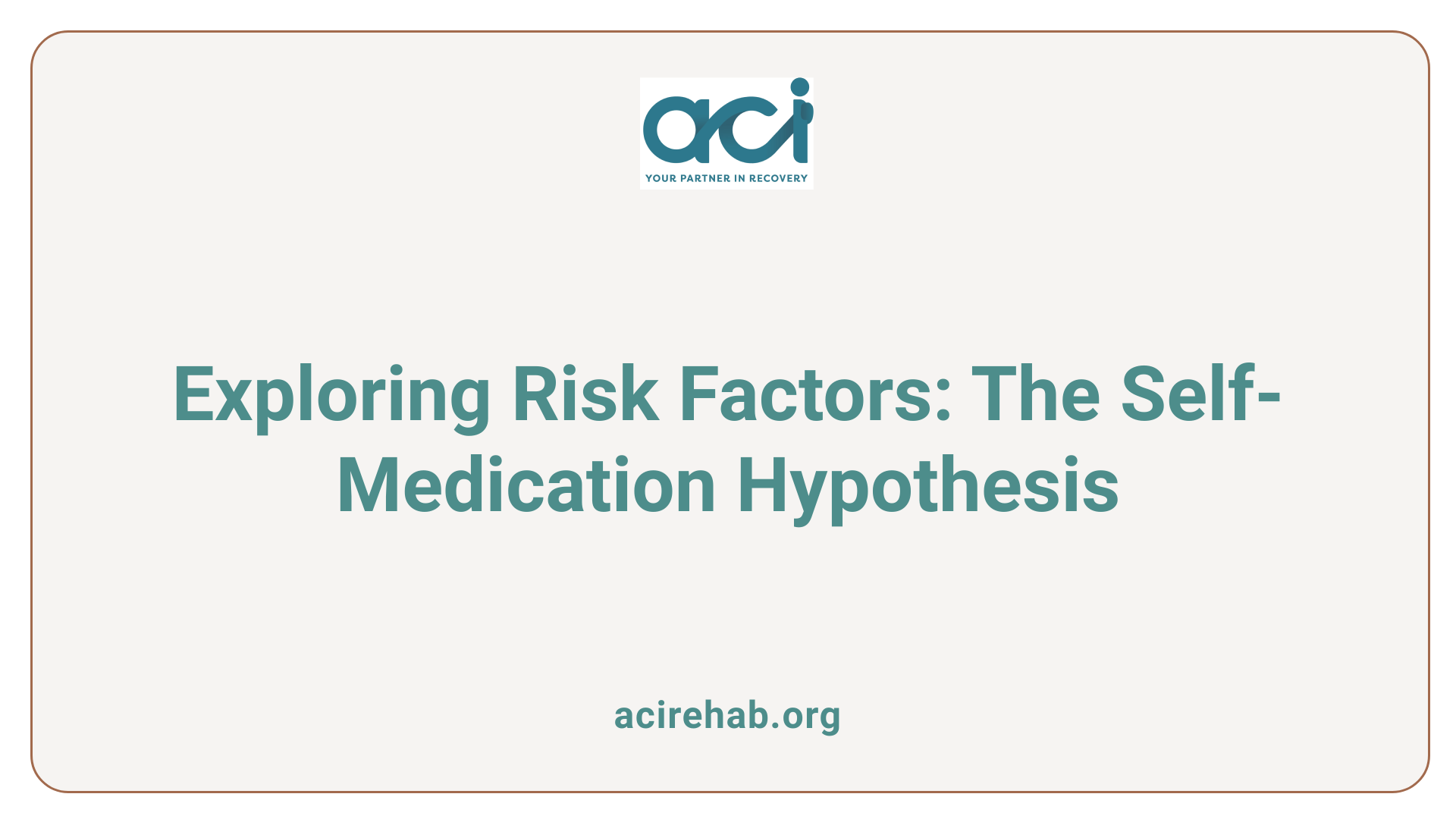
Common Risk Factors
Several risk factors contribute to the likelihood of developing anxiety disorders alongside substance use disorders (SUDs). These may include genetics, trauma history, gender, environmental stressors, and sleep quality. Individuals with a family history of addiction or anxiety may be at increased risk due to inherited psychological traits and predispositions.
Role of Self-Medication
Many individuals facing anxiety turn to substances as a coping mechanism, a behavior known as self-medication. Substances like alcohol or benzodiazepines may initially provide temporary relief from anxiety symptoms. However, this relief often deteriorates over time, leading to increased substance use as individuals seek greater doses to achieve the same effect.
Vicious Cycle of Substance Use
The relationship between anxiety and substance misuse creates a vicious cycle. As reliance on substances grows, anxiety symptoms often worsen, leading individuals to consume more of the substance to alleviate heightened anxiety. This cycle can complicate recovery efforts, making it vital to treat both conditions concurrently for improved outcomes.
The National Institute on Drug Abuse highlights that those with anxiety disorders are twice as likely to develop an addiction, underlining the importance of understanding and addressing this self-medication pattern.
Dual Diagnosis: Integrated Approaches to Treatment
Importance of Dual Diagnosis
Dual diagnosis refers to the condition wherein an individual suffers from both an anxiety disorder and a substance use disorder (SUD). This co-occurrence is quite common, with about 20% of those with anxiety disorders also facing addiction challenges. Recognizing and treating both conditions simultaneously is crucial, as the presence of one can exacerbate the other, complicating recovery efforts.
Psychotherapy and Pharmacotherapy
Effective treatment for individuals with dual diagnoses often employs a combination of psychotherapy and pharmacotherapy. Medications, such as selective serotonin reuptake inhibitors (SSRIs), are typically favored over benzodiazepines due to their lower addiction potential. Treatment plans may include structured detox services followed by counseling to address both mental health and substance abuse issues.
Cognitive Behavioral Therapy (CBT)
Cognitive Behavioral Therapy (CBT) has proven effective for managing co-occurring anxiety and addiction. CBT helps individuals identify and alter negative thought patterns that contribute to both anxiety and substance use. By focusing on coping strategies and behavioral modifications, CBT can pave the way for a healthier relationship with stressors, significantly improving treatment outcomes and long-term recovery prospects.
Effects of Substance Withdrawal on Anxiety
Does quitting drugs cause anxiety?
Quitting drugs can indeed cause anxiety, particularly during the withdrawal phase, as the body reacts to the absence of the substance. This situation is complicated by the significant overlap between anxiety disorders and substance use disorders (SUDs); approximately 17.7% of individuals with a SUD also meet the criteria for an independent anxiety disorder. This interplay creates a cycle where anxiety leads to substance use as a coping mechanism, while substance use exacerbates anxiety symptoms.
The symptoms of withdrawal can manifest in various ways, including increased restlessness, insomnia, and panic attacks, all of which are hallmark signs of anxiety. As the brain adjusts to the absence of the substance, individuals may experience heightened anxiety, which could potentially lead to relapse if not managed effectively.
Role of addiction in exacerbating anxiety
Addiction can significantly worsen anxiety levels. For those who self-medicate with substances to alleviate their anxiety, the sudden absence of the substance may lead to increased feelings of unease, potentially causing a rebound effect that intensifies anxiety symptoms. This bidirectional relationship emphasizes the need for a comprehensive approach to treatment that addresses both addiction and anxiety simultaneously.
Effective treatment strategies
Effective treatments for anxiety during withdrawal often include a mix of medication and psychological therapy. Selecting medications like SSRIs can help manage anxiety levels, while therapeutic approaches such as Cognitive Behavioral Therapy (CBT) offer strategies to cope with both the withdrawal and anxiety symptoms. The combination of therapeutic support and medical management can lead to improved long-term recovery outcomes, ensuring that both anxiety and substance dependence are addressed adequately.
Addiction to Anxiety: A Psychological Insight
Understanding Anxiety Addiction
Yes, you can become addicted to anxiety. This phenomenon reflects a psychological pattern where individuals develop a craving for the sensation of worry. Psychiatrist Dr. Judson Brewer explains that this craving stems from the brain’s learned behavior to seek out feelings associated with anxiety. Similar to how one might become dependent on substances or specific routines, anxiety can also become an ingrained part of one’s daily life.
Brain’s Role in Developing Anxiety Craving
The brain plays a crucial role in this process. When faced with stressors, the body activates the fight-or-flight response, causing a release of neurotransmitters linked with anxiety. Over time, this reaction can lead to a cycle of anxiety where individuals unconsciously seek situations that elicit this response for the adrenaline rush they provide. This cyclical pattern becomes a coping mechanism but can ultimately exacerbate anxiety and lead to a dysfunctional relationship with one’s emotions.
Methods to Overcome This Addiction
Breaking the cycle of anxiety addiction is entirely feasible. Effective strategies include mindfulness techniques, cognitive behavioral therapy (CBT), and progressive relaxation practices. By employing these methods, individuals can learn to manage their anxiety and reduce their reliance on worry. Support groups and professional therapy can also offer guidance to help them reclaim control over their mental health.
Support Systems and Resources in Recovery
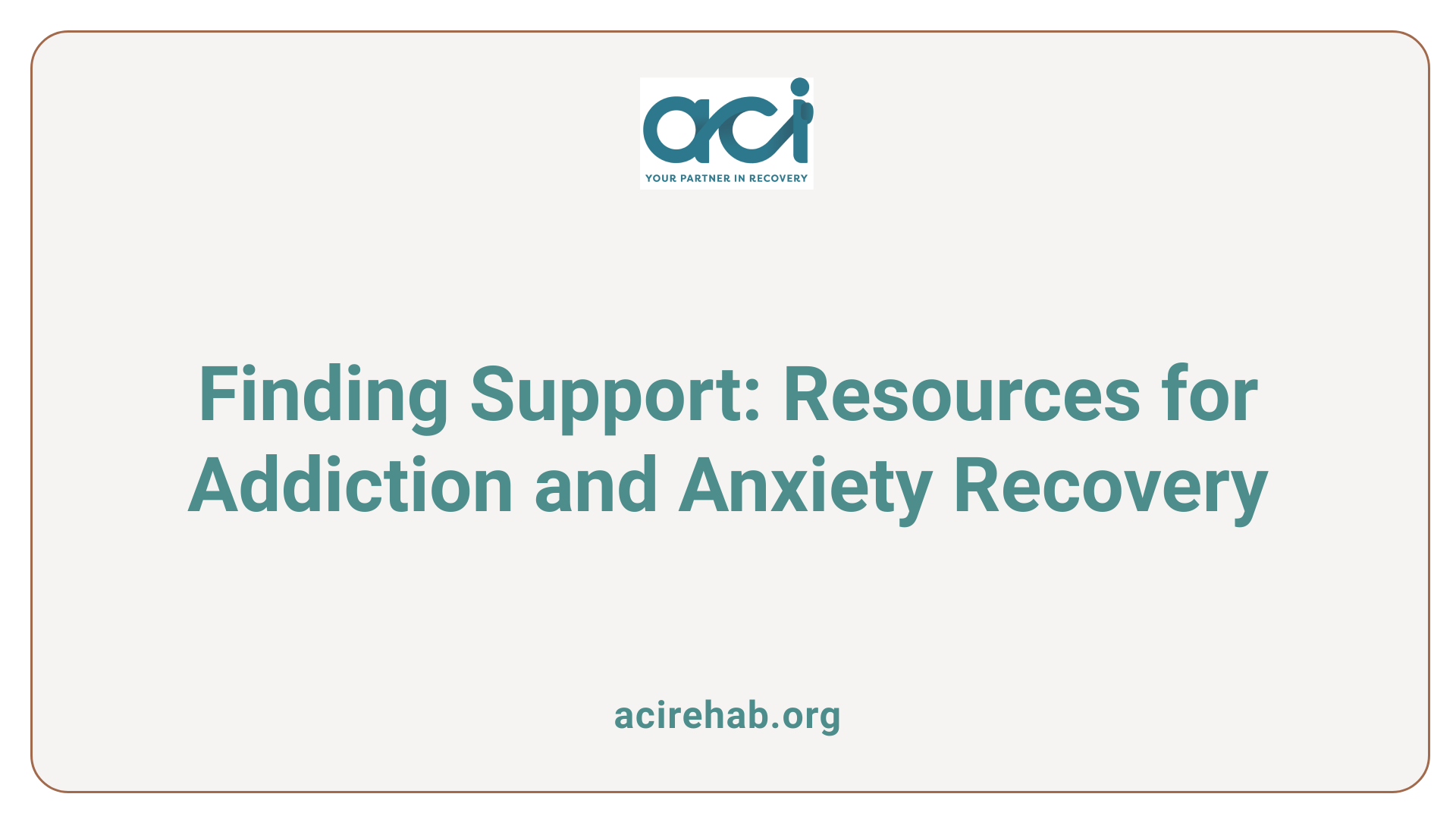
Role of Support Groups
Support groups play a vital role in recovery for individuals dealing with anxiety and addiction. These forums provide not just emotional support, but also shared experiences that can help participants feel less isolated. Group activities often promote accountability and provide encouragement among peers who understand the struggles of co-occurring disorders.
Community Resources
Local community resources, including mental health clinics and addiction treatment centers, offer a range of services. These can include counseling, group therapy, and educational workshops tailored to help individuals manage both anxiety and substance use disorders. Access to these resources is essential for sustained recovery.
SAMHSA Helpline Services
The SAMHSA National Helpline offers 24/7 confidential support for those facing mental and substance use disorders. They provide information about treatment facilities, support groups, and community resources specifically designed to address both anxiety and addiction, ensuring individuals receive comprehensive support tailored to their needs.
| Service | Description | Purpose |
|---|---|---|
| Support Groups | Peer-led meetings for emotional support and shared experiences | Foster connection and accountability |
| Community Resources | Local clinics offering counseling and workshops | Enhance coping strategies and recovery |
| SAMHSA Helpline | 24/7 confidential information service | Guide individuals to appropriate resources |
Conclusion
The intersection of anxiety and addiction presents significant challenges but also opportunities for transformative healing. Through integrated treatment approaches that address both conditions simultaneously, individuals have the potential to achieve lasting recovery. It is crucial to foster understanding and provide resources that support individuals on their journey to overcoming the dual hurdles of anxiety and addiction. As research continues to unveil the complexities of these disorders, targeted interventions can be better designed to enhance recovery outcomes and improve overall quality of life.
References
- Substance Use Disorders and Anxiety | American Addiction Centers
- Anxiety and Substance Use Disorders: A Review – PMC
- Generalized Anxiety Disorder – Addiction Center
- SAMHSA’s National Helpline
- Treatment for Anxiety Disorder and Drug Addiction – Avery Lane
- Connection Between Anxiety and Addiction | Silver Ridge Recovery
- Anxiety Disorders with Comorbid Substance Use Disorders
- Anxiety and Substance Abuse: A Closer Look At The Connection
- Are You Addicted to Anxiety? Learn How Not to Be | Psychology Today
- Anxiety Disorders & Drug or Alcohol Addiction – Adcare.com

